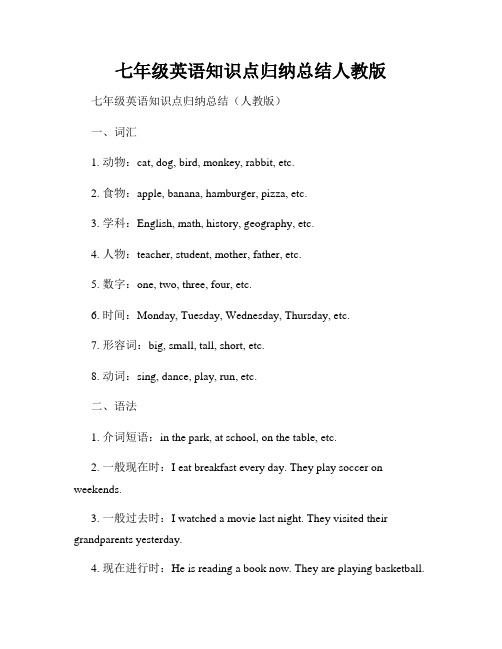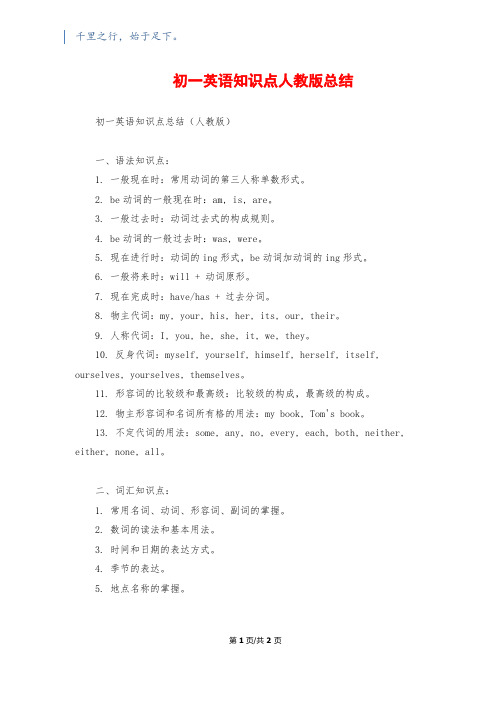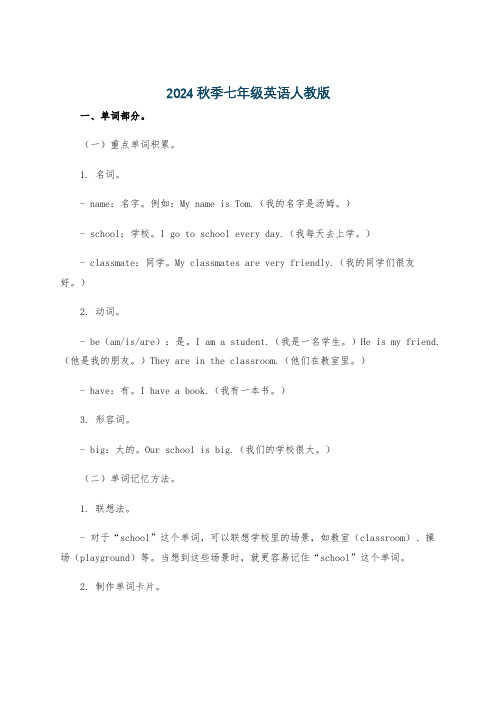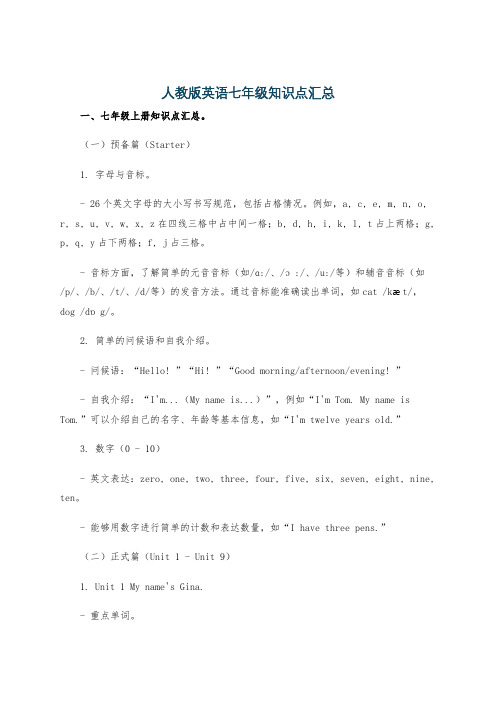人教版初一英语知识点大全
七年级英语知识点归纳总结人教版

七年级英语知识点归纳总结人教版七年级英语知识点归纳总结(人教版)一、词汇1. 动物:cat, dog, bird, monkey, rabbit, etc.2. 食物:apple, banana, hamburger, pizza, etc.3. 学科:English, math, history, geography, etc.4. 人物:teacher, student, mother, father, etc.5. 数字:one, two, three, four, etc.6. 时间:Monday, Tuesday, Wednesday, Thursday, etc.7. 形容词:big, small, tall, short, etc.8. 动词:sing, dance, play, run, etc.二、语法1. 介词短语:in the park, at school, on the table, etc.2. 一般现在时:I eat breakfast every day. They play soccer on weekends.3. 一般过去时:I watched a movie last night. They visited their grandparents yesterday.4. 现在进行时:He is reading a book now. They are playing basketball.5. 祈使句:Sit down, please. Don't talk in class.6. 情态动词:can, could, may, might, must, etc.7. 名词所有格:my book, his car, our house, etc.8. 基数词与序数词:one - first, two - second, three - third, etc.三、语音1. 元音音标:/i:/, /i/, /e/, /æ/, etc.2. 辅音音标:/p/, /b/, /t/, /d/, etc.3. 元音连读:I am → I'm, he is → he's, etc.4. 重读音节:eleVEN, APril, etc.四、基础对话1. 问候与介绍:Hello! What's your name? Nice to meet you.2. 自我介绍:My name is Lisa. I am 12 years old. I am from China.3. 家庭成员:This is my mother. Her name is Kate. She is a teacher.4. 学校活动:We have a music class on Monday. We play soccer on Friday.5. 购物:How much is this T-shirt? Can I help you? I want to buy a new hat.6. 餐厅用餐:What would you like to order? I want a hamburger and a cola.7. 问路:Excuse me, where is the library? Go straight and turn left.8. 旅游计划:We are going to visit the Great Wall next weekend.五、阅读理解Passage 1: 请根据短文内容,判断下列句子正(T)误(F)。
初一英语知识点人教版总结

千里之行,始于足下。
初一英语知识点人教版总结初一英语知识点总结(人教版)一、语法知识点:1. 一般现在时:常用动词的第三人称单数形式。
2. be动词的一般现在时:am, is, are。
3. 一般过去时:动词过去式的构成规则。
4. be动词的一般过去时:was, were。
5. 现在进行时:动词的ing形式,be动词加动词的ing形式。
6. 一般将来时:will + 动词原形。
7. 现在完成时:have/has + 过去分词。
8. 物主代词:my, your, his, her, its, our, their。
9. 人称代词:I, you, he, she, it, we, they。
10. 反身代词:myself, yourself, himself, herself, itself, ourselves, yourselves, themselves。
11. 形容词的比较级和最高级:比较级的构成,最高级的构成。
12. 物主形容词和名词所有格的用法:my book, Tom's book。
13. 不定代词的用法:some, any, no, every, each, both, neither, either, none, all。
二、词汇知识点:1. 常用名词、动词、形容词、副词的掌握。
2. 数词的读法和基本用法。
3. 时间和日期的表达方式。
4. 季节的表达。
5. 地点名称的掌握。
第1页/共2页锲而不舍,金石可镂。
三、句型知识点:1. 陈述句的基本句型:主语+谓语+宾语。
2. 疑问句的基本句型:助动词/系动词/情态动词+主语+动词?3. 否定句的基本句型:主语+助动词/be动词/情态动词+not+动词原形。
4. be动词的疑问句和否定句的构成。
5. 以What/Who/Where/When/How开头的特殊疑问句的构成。
四、阅读技巧和写作要点:1. 阅读理解题的解题技巧。
2. 写作要点:选择合适的词汇和句型,注意语法和拼写错误,组织结构和内容的连贯性。
2024秋季七年级英语人教版

2024秋季七年级英语人教版一、单词部分。
(一)重点单词积累。
1. 名词。
- name:名字。
例如:My name is Tom.(我的名字是汤姆。
)- school:学校。
I go to school every day.(我每天去上学。
)- classmate:同学。
My classmates are very friendly.(我的同学们很友好。
)2. 动词。
- be(am/is/are):是。
I am a student.(我是一名学生。
)He is my friend.(他是我的朋友。
)They are in the classroom.(他们在教室里。
)- have:有。
I have a book.(我有一本书。
)3. 形容词。
- big:大的。
Our school is big.(我们的学校很大。
)(二)单词记忆方法。
1. 联想法。
- 对于“school”这个单词,可以联想学校里的场景,如教室(classroom)、操场(playground)等。
当想到这些场景时,就更容易记住“school”这个单词。
2. 制作单词卡片。
- 把单词写在卡片的一面,解释和例句写在另一面。
例如,对于“name”这个单词,正面写“name”,反面写“名字;My name is Lucy.”,随时拿出来复习。
二、语法部分。
(一)一般现在时。
1. 用法。
- 表示经常或习惯性的动作或状态。
例如:He gets up at six every day.(他每天六点起床。
)- 表示客观事实或真理。
The earth goes around the sun.(地球绕着太阳转。
)2. 句型结构。
- 肯定句:主语+动词原形(第三人称单数形式)+其他。
- I like English.(我喜欢英语。
)- He likes music.(他喜欢音乐。
)- 否定句:主语+don't/doesn't+动词原形+其他。
人教版英语七年级知识点汇总

人教版英语七年级知识点汇总一、七年级上册知识点汇总。
(一)预备篇(Starter)1. 字母与音标。
- 26个英文字母的大小写书写规范,包括占格情况。
例如,a, c, e, m, n, o, r, s, u, v, w, x, z在四线三格中占中间一格;b, d, h, i, k, l, t占上两格;g, p, q, y占下两格;f, j占三格。
- 音标方面,了解简单的元音音标(如/ɑ:/、/ɔ:/、/u:/等)和辅音音标(如/p/、/b/、/t/、/d/等)的发音方法。
通过音标能准确读出单词,如cat /kæt/,dog /dɒg/。
2. 简单的问候语和自我介绍。
- 问候语:“Hello! ”“Hi! ”“Good morning/afternoon/evening! ”- 自我介绍:“I'm...(My name is...)”,例如“I'm Tom. My name is Tom.”可以介绍自己的名字、年龄等基本信息,如“I'm twelve years old.”3. 数字(0 - 10)- 英文表达:zero, one, two, three, four, five, six, seven, eight, nine, ten。
- 能够用数字进行简单的计数和表达数量,如“I have three pens.”(二)正式篇(Unit 1 - Unit 9)1. Unit 1 My name's Gina.- 重点单词。
- name(名字),nice(美好的),to(不定式符号,无实义),meet(遇见),too(也),your(你的;你们的),his(他的),her(她的)。
- 重点句型。
- “What's your name? ”“My name's...(I'm...)”用于询问和回答名字。
- “Nice to meet you. ”“Nice to meet you, too.”用于初次见面时的问候。
人教版七年级英语各单元知识点

人教版七年级英语各单元知识点Unit 1 My name's Gina.一、重点单词。
1. name:名字,可数名词。
例如:My name is Tom.2. nice:令人愉快的;宜人的。
如:Nice to meet you.(很高兴见到你。
)3. to:常用于动词原形前,表示目的或意图,也可用于一些固定搭配中,如Nice to meet you.4. meet:遇见;相逢。
5. too:也;又;太。
例如:I'm fine, too.(我也很好。
)6. your:你的;你们的,形容词性物主代词,后面需接名词,如your name(你的名字)。
7. his:他的,形容词性物主代词,如his book(他的书)。
8. her:她的,形容词性物主代词,例如her pen(她的钢笔)。
二、重点短语。
1. my name:我的名字。
2. your name:你的名字。
3. first name:名字(在英语中,名字在前,姓氏在后,first name就是指个人的名字)4. last name:姓氏(也可表达为family name)5. nice to meet you:很高兴见到你(回答常用Nice to meet you, too.)三、重点句型。
1. —What's your name?(你叫什么名字?)—My name's Gina.(我的名字是吉娜。
)2. —Nice to meet you.(很高兴见到你。
)—Nice to meet you, too.(我也很高兴见到你。
)3. —What's his name?(他叫什么名字?)—His name's Tom.(他的名字是汤姆。
)4. —What's her name?(她叫什么名字?)—Her name's Mary.(她的名字是玛丽。
)Unit 2 This is my sister.一、重点单词。
2024 人教版七年级英语上册知识点

2024人教版七年级英语上册知识点1.Starter Unit1Good morning!(1)重点短语:∙Good morning!(早上好!)∙Good afternoon!(下午好!)∙Good evening!(晚上好!)∙How are you?(你好吗?)∙I'm fine,thanks.(我很好,谢谢。
)(2)例句:∙Good morning,Miss Li!(早上好,李老师!)∙Good afternoon!Nice to see you.(下午好!很高兴见到你。
)∙Good evening!What are you doing?(晚上好!你在做什么?)∙How are you today?(你今天怎么样?)∙I'm fine,thanks.And you?(我很好,谢谢。
你呢?)(3)重点语法:∙字母的读音和书写:掌握26个英文字母的大小写形式、读音及基本书写规范,这是学习英语的基础。
∙音标基础:初步接触一些简单的音标,为后续学习单词的正确发音做准备,比如元音音标/æ/、/e/、/ɪ/等和一些简单的辅音音标/p/、/b/、/t/等。
∙Be动词的简单用法:学习Be动词am、is、are的最基本用法。
在这个单元中,主要让学生了解I搭配am,you搭配are,这是最基础的Be动词搭配形式。
2.Starter Unit2What's this in English?:(1)重点单词:map(地图)cup(杯子)ruler(尺子)pen(钢笔)orange(橙子)jacket(夹克衫)key(钥匙)quilt(被子)what(什么)in(在……里)English(英语;英文)。
(2)重点短语:∙询问物品:What's this in English?(这个用英语怎么说?)、What's that inEnglish?(那个用英语怎么说?)∙回答方式:It's a/an...(它是一个……)。
初一的知识点英语
初一的知识点英语一、人教版初一英语知识点汇总。
1. 26个英文字母。
- 大写字母:A - Z;小写字母:a - z。
- 字母的书写规范:包括大小写字母的占格(例如,a, c, e等小写字母占中间一格;b, d, h等占上中两格;g, p, q等占中下两格;f占上中下三格)。
- 字母的读音:元音字母(a, e, i, o, u)和辅音字母的发音区别。
2. 单词。
- 名词。
- 可数名词:有单复数形式。
例如,book - books,pen - pens。
复数形式的变化规则包括:- 一般情况加 -s,如dog - dogs。
- 以s, x, ch, sh结尾的加 -es,如box - boxes,watch - watches。
- 以辅音字母 + y结尾的,把y变为i再加 -es,如baby - babies。
- 以o结尾的,有生命的加 -es(如tomato - tomatoes),无生命的加 -s(如photo - photos)。
- 不可数名词:没有复数形式,如water, milk, rice等。
- 代词。
- 人称代词:主格(I, you, he, she, it, we, you, they)和宾格(me, you, him, her, it, us, you, them)。
主格用于作主语,宾格用于作宾语。
例如,I like him.- 物主代词:形容词性物主代词(my, your, his, her, its, our, your, their)和名词性物主代词(mine, yours, his, hers, its, ours, yours, theirs)。
形容词性物主代词后面要接名词,名词性物主代词可单独使用。
例如,This is my book. That book is mine.- 动词。
- 动词的原形和第三人称单数形式。
在一般现在时中,当主语是第三人称单数(he, she, it等)时,动词要加 -s或 -es。
最新人教版七年级英语(全册)重点知识归纳总结
最新人教版七年级英语(全册)重点知识归纳总结7AUnit 11.an e-dog 一只电子狗2.read books (to sb) (为某人)读书3.in Class 1, Grade 2 (小->大) 在二年级一班4.love doing sth =like doing sth 喜欢做某事=like to do sth=enjoy doing sth5.live in sp 住在某地6.in the Reading club 在阅读俱乐部7.have sth 有某物8.be born 出生9.in+大地点在某地10.play football 踢足球11.after school/lunch/breakfast/supper 放学后/午饭后/早饭后/晚饭后e from sp=be from sp 来自某地13.long black hair 长黑发14.listen to music/sb 听音乐(某人)15.let sb do sth 让某人做某事16.work hard/study hard 努力工作/学习17.wear (a pair of) glasses 戴(一副)眼镜18.play computer games 玩电脑游戏19.enjoy doing sth 享受做某事oneself 享受某人自己20. play + 球类玩球类the+乐器玩乐器with sb/玩具和某人玩/玩玩具games 玩游戏against sb 和某人比赛for+球队为球队(比赛)20.take a bus to (sp)=go to sp by bus 坐巴士去某地21.a good football player 一个好的足球运动员22.the newest member 最新的成员23.be good at (doing) sth=do well in (doing) sth 善于做某事24.want to do sth 想要做某事25.look happy 看起来高兴26.my favorite football player 我最喜欢的足球运动员27.borrow sth from sb 向某人借某物28.at the weekend 在周末29.for the weekend (为了)度过周末30.dark brown eyes 深棕色眼睛31.lots of=a lot of=many/much 许多32.in +语言(English 等) 用某种语言33.write (a letter) to sb 给某人写(一封信)34.be + adj.helpful 有帮助的polite 礼貌的35. do doing sth: go swimming/shopping/running 做某事to do sth; go to see a film36.half an hour 半小时37.one and a half hours 一个半小时38.a school football team 一个学校足球队7A Unit 21.look at sth/the time/me 看某物/时间/我for 寻找after 照顾into 调查out of 当心up 查找2. It’s time(for sb) to do sth 是某人做某事的时间了for sth (supper/breakfast) 是做某事(晚饭/早饭)的时间3. be going to do sth 要去做某事4. have fun=have a good time 玩得高兴=enjoy onself5.want to do sth 想要做某事6.go to do sth 去做某事sleep 去睡觉drink a cup of coffee 去喝一杯咖啡sp(bed/the cinema) 去某地(床上/电影院)7.do (morning/eye) exercises 做晨练/眼保健操8.have an English lesson/class 上一节英语课9.do (after-school) activities 参加课外活动10.watch TV 看电视11.There be is/are 有…Was/were12.at 在午饭/早饭/晚饭时after lunchtime/breakfast/supper 午饭/早饭/晚饭后before 午饭/早饭/晚饭前13. be nice/kind/friendly to sb 对某人好/和蔼/友好14. go to the (school) library 去(学校)图书馆15. chat with each other 互相交谈sb 与某人交谈have a chat with sb 和某人有一个谈话16.in the morning 在早上17.every morning 每个早上18.this morning 今天早上19.on Monday morning 在周一早上20.on a sunny morning 在一个晴朗的早上21.at+时间点在某个时间22.my favourite lesson/ subject/animal 我最喜欢的课/科目/动物23.spend some time (in) doing sth 在做某事上花时间on sth 在某事上花时间in sp 在某地度过一段时间24.practice doing sth (with sb) (和某人)练习做某事25.do sth with sb 和某人做某事26.a good swimmer/runner/singer 一个好的游泳/跑步运动员/歌手27.send sb an email=send an email to sb 给某人发一封电子邮件=email sb28.start/begin to do sth 开始做某事doing sth29.have some/no time to do sth 有时间/没时间做某事30.most 大多数some 一些all 所有的none of…一个都没有one 其中一个two 其中两个a lot 许多31. make a model plane 做一个飞机模型32. read books/newspapers 读书/报纸33. too much+ n.(不可数) 太多+不可数名词too many+ n.(可数) 太多+可数名词much too+ adj. 太…+形容词V词组+ too much =>drinking too much is bad喝太多不好very much34. watch 看一场足球比赛win 赢一场足球比赛lose a fooball match 输一场足球比赛have 有一场足球比赛35.live in sp 住在某地36.a piece of news 一则新闻37.all the time= always 一直38.at/in the volleyball court 在排球场39.on+ 7 天在一周的某天a cold morning 在一个寒冷的早上某月某日在某月某日40.know a lot/much about…知道很多关于…41.a dancing lesson 一节舞蹈课42.have some/much/no time to do sth 有一些时间/没有时间做某事43.know much/a lot/a little about sb/sth 知道一些/很多/少关于某人/事44.talk to sb 和某人聊(某事)(about sth)with sb45.want to do sth=would like to do sth 想要做某事46.say sth to sb 和某人说某事goodbye 说再见hello 说你好47.receive /get some information about sth 得到关于某事的信息48.will do sth=shall do sth 将要做某事=be going to do sth49.spend some time /money on sth 在某事上花时间/钱50.thank you for sth 谢谢你做了某事doing sthanize a class trip 组织一次班级旅行52.the price of sth (for sb) (给某人的)某物的价格53.can do sth= be able to do sth 有能力做某事54.look forward to sth 期望(做)某事doing sth=expect sthto do sth55.think of sth 想到某事about sth 考虑某事56.need to do sth 需要做某事57.borrow sth from sb 和某人借某物<=>lend sth to sb= lend sb sth 借给某人某物58.be good/bad for…对…好/不好59.help sb (to) do sth 帮助某人做某事60.be ready (for sth) 准备好做某事get ready for sth61.chat with sb=>talk with sb 和某人聊天62.the answer to the question 问题的答案63.the way to sp 去某地的路64.the key to the door 这扇门的钥匙65.a difficult question 一个困难的问题66.an easy question 一个简单的问题67.go to the Computer Club 去电脑俱乐部68.let sb do sth 让某人做某事69.ask sb to do sth 叫某人去做某事about sth 问某人关于某事70.read a newspaper/book 读一本杂志/书71.listen to music/the radio/me 听音乐/广播/我72.make (a cup of) tea/coffee 做(一杯)茶/咖啡a noise 发出声音73. watch TV 看电视a football match 看一场足球比赛74. see a film 看一场电影a puppet show 看一个木偶表演语法点人称代词主格/宾格8对我I me你you you他he him她she her =>主格/宾格的用法它it it我们we us你们you you他们they them7A Unit 31.let sb do sth 让某人做某事us go 让我们走me see 让我看看us celebrate your success 让我们庆祝你的成功2.be interesting 感兴趣interested in(doing sth) 对(做某事)感兴趣3. a beautiful dress 一条美丽的裙子dress oneself 打扮某人自己dress (sb) up (as a ghost) 把(某人)装扮成(鬼)4.be doing sth 在做某事5.will do sth 将要做某事6.my favourite animal/ food/ drink/ meat/ colour/ lesson/subject/ festival我最喜欢的动物/食物/饮料/肉类/颜色/课程/科目/节日7.like/love to do sth 喜欢做某事doing sth8.tell sb the truth 告诉某人真相your name 告诉某人你的名字sb about sth/your family 告诉某人关于某事/你的家庭sb to do sth 告诉某人做某事9. in the U.S.A/America 在美国the U.S./America10.have a special party 举办一个特殊的聚会11.on October 31st. 在10月31日October 3131 October31st. Octoberthe 31st. of October12.knock at/on the door 敲门13.give sb sth=give sth to sb 给某人某物us a treat 给我们一个款待14.play trick or treat 玩不给糖就捣蛋15.play a rick on (sb) 戏弄某人16.paint sth+颜色把某物涂上颜色our face red 把脸涂红17.make some pumpkin lanterns 做一些南瓜灯18.wear a tiger costume 穿老虎装19.special candles 特殊的蜡烛20.have hot drinks 喝热饮a drink 喝饮料21.sharp teeth 尖锐的牙齿22.on that day 在那天23.eat hot food 吃热的食物moon cakes/ dumplings/ turkey 吃月饼/饺子/火鸡24.a special festival 一个特殊的节日25.on the evening of October 31st. 在10月31日的晚上on a cold evening 在一个寒冷的夜晚on Monday evening 在周一晚上in the evening 在晚上this evening 今晚yesterday evening 昨晚the day before yesterday in the evening 前天晚上tomorrow evening 明天晚上the day after tomorrow in the evening 后天晚上26.make sth out of 厚材料由某物制成27.make a lantern out of a pumpkin 用南瓜做一个灯28.take sb/sth for a walk=have a walk with sb/sth 带某人/某物散步29.a boy(in a special costume) 一个(穿特殊服装的)男孩30. It’s one’s 序数词time to do sth 这是某人第某次做某事It is time to do sth 是做某事的时间了31.at night -->in the evening 在晚上32.a piece of card 一张卡片33.put sth in/on/under sth 把某物放在某物里面/上面/下面candles in the pumpkin lanterns 把蜡烛放在南瓜灯里34.in the east/west/south/north 在东部/西部/南部/北部35.in this way 用这种方法that way 用那种方法many ways 用很多种方法English 用英文36.give sb (a treat of) sth 给某人一个某样的款待37.at the weekend 在周末语法点1. in+月份on +7天at +小时刻点+季节+日期+无day节日+年份+有day节日+一日三餐+一日早中晚+具体某天早中晚+年龄/速度+大地点+小地点+固搭+固定搭配2.特殊疑问词what how oldwho how longwhose how oftenwhere how soonwhen how many/muchwhat timewhyhow3. some +n.可数肯陈+希望得到肯定回答的请求建议would you like some…?+n.不可数any: 否,一般疑问4.频度adv. (always/ sometimes/ often/ usually/ seldom/ never…)句型偶尔出现了宾从条状、词汇节日有day无day7A Unit 41.let sb do sth 让某人做某事2.have a hamburger = eat a hamburger 吃一个汉堡+食物=eat sth 吃某物+饮料=drink sth 喝某物+物品=have got sth 得到某物+a party=hold a party 举行一个派对3.need sth/a lot of energy 需要很多能量to do sth 需要做某事4.walk/run/fly/go/swim/jump to sp 走/跑/飞/游泳/跳去某地5.once a day 一天一次twice a day 一天两次three times a day 一天三次many times a day 一天很多次6.like sth 喜欢某物dislike sth=>hate sth 不喜欢某物7.want to do sth 想要做某事8.for+时间段持续了多久9.It’s +adj.+ for sb to do sth做某事对某人来说是…的of sb 某人是…的10.get tired=become tired= be tired 感到累了11.a healthy diet 一个健康的饮食12.go/be on a diet 节食13.keep fit 保持健康14.sweet snacks 甜的零食15.too much sugar 太多糖n.不可数much too + adj.V词组+too much16.eat/have sth for breakfast 早饭吃某物17.often do sth 经常做某事18.drink some milk 喝一些牛奶19.at 在晚餐的时候after dinner 在晚餐后before 在晚餐前for 作为晚餐20.on the Internet 在网上21.a top student 一个尖子生22.at the top of 在…上面23.plan to do sth=intend to do sth=going to do sth 打算做某事24.a swimming pool 一个游泳池25.a dining room 一个餐厅26.a sitting room 一个客厅27.in front of…<=>behind+方位前后在…前面before after+时间先后28.my free time 我空余的时间29.be busy with sth 忙于做某事doing sth30.go to do sth 将要做某事31.go to sp with sb 和某人去某地32.go to sp for sth 为了某事去某地33.go roller skating 去溜冰running 去跑步shopping 去购物dancing 去跳舞34.what about=how about …怎么样35.a carton of…一盒…36.a bottle of…一瓶…37.a+容器+of…一…38.not…any more不再…39.good luck 好运40.give sb some energy 给某人能量41.keep/stay healthy 保持健康42.without doing sth 没有做某事词汇1. 食物可数不可数2. 频度adv.=>how often句型1.There be+东西+地点2.How+特殊疑问句3.宾从/时状偶尔出现语法名词可数n单数n复数不可数There is an apple on the deska pair of shoes7A Unit 51.want/would like sth 想要某物to do sth 想要做某事sb to do sth 想要某人做某事2.do sth with sb 和某人做某事go shopping with me 和我购物3.all right=ok 好That’s all right. = That’s ok.好的4.need sth 需要某物to do sth 需要做某事需要某人做某事5. a birthday present 一个生日礼物6.two birthday presents 两个生日礼物7.buy sth for sb= buy sb sth 给某人买某物8.give sth to sb= give sb sth 给某人某物9. a good idea 好主意10.two yo-yoes 两个溜溜球11.look for sth 找某物at 看after 照顾into 浏览up 查找forward to doing sth 期待做某事around 环顾四周out of 当心12.wait for a moment/minute 等一会wait 15 minutes for the bus 等巴士等了15分钟13.have a look at sth=take a look 看一下14.sth cost sb some money=sb spend some money on sth 某物花了某人一些钱15.an expensive card 一张昂贵的卡片16.There’s a discount on sth某物有打折17.a hair clip 发卡18.a kind of clips 一种夹子19.many (different) kinds of clips 很多(不同)种类的夹子20.be sure+宾从确定…21.have enough 有足够的钱做某事much 有些钱做某事plenty of 有大量的钱做某事lots of money to do sth 有很多钱做某事a lot of 有很多钱做某事no 没有钱做某事little 有一点钱做某事22.enough + n. 足够的…adj. + enough 足够…23.a shop keeper 店主24.a birthday party/card/present 一个生日派对/卡片/礼物25.something good/important 好的/重要的事情26.at the moment 目前27.visit sb=call on sb 拜访某人28.visit sp=call at sp 参观某地29.wait for sb/sth (to do sth) 等待(某人)做某事a moment 等一会30. a shoe shop 一家鞋店31. my favorite animal/fruit/T-shirt/color 我最喜欢的动物/水果/T恤/颜色32. buy sth for sb=buy sb sth 给某人买某物33. ask sb for sth 问某人某事to do sth 让某人做某事34. a Christmas present 一件圣诞礼物35. the same+ n单数相同的…36. different+ n复数不同的…37. a pair of shoes/trousers/glasses/gloves 一双鞋/一条裤子/一副眼镜/一副手套38. find sth/sb+adj. 发现某人/某物…make sth/sb+adj. 让某人/某物…39.half past four=four thirty 四点半40.in the football field 在足球场the playground 在操场41.write a letter to sb 写信给某人42.receive a letter from sb 收到某人的信e/go to sp 来/去某地to so sth 来/去做某事44.visit sb/sp=be on a visit to sb/sp 拜访某人/参观某地45.a shopping list/bag 一个购物清单/购物袋46.carry sth to sp 把某物带到某地47.sit at the table 坐在桌子上on the floor 坐在地上in the classroom 坐在教室里48. make wishes 许愿mistakes 犯错tea/coffee 做茶/咖啡48.would like sth 想要某物to do sth 想要做某事sb to do sth 想要某人做某事49.put on 穿上try on 试穿语法1.V—>Ving2.现进7A Unit 61. spend some time on sth 在某事上花时间in sp 在某地花时间in (doing) sth 在做某事上花时间2. 基数词+more+n复数=another+数词+n复数two more minutes=another two minutes 再多两分钟one more apple=another apple 再个苹果3.感叹句How +adj.+主+谓!What+ a/an adj.+n.单数(+主+谓)!adj.+n.复数(+主+谓)!4.be from sp=come from sp 来自某地5.be in Class 1, Grade 7 在七年级一班6.welcome to sp 欢迎来到某地7. a fashion show 一个时尚表演8.want to do sth 想要做某事9.Project Hope 希望工程10.show sb sth=show sth to sb 向某人展示某物11.look+adj.(colourful) 看起来…(五颜六色)12.a yellow cotton blouse 一件黄色棉质女式衬衫13.复合名词 a wool skirt 一条羊毛短裙a pair of leather boots 一双皮靴a silk blouse 一件丝绸女士衬衫14. think of(doing sth) 想起做某事about sth 考虑某事15. talk about (doing) sth 谈起做某事sb 谈到某人with/to sb 和某人交谈16. raise money 筹集资金17. a photo of my family/the fashion show 一张我的全家福/时尚表演的照片18. turn on the lights 打开灯19. go to sp 去某地to do sth 去做某事doing sth 去做某事for a walk 去散步20. have dinner (with sb) (和某人)吃晚餐21. dress up in +衣物/颜色穿上…dress onself 自己穿衣服be dressed in+衣物/颜色穿着…22. 连词:first-->then-->next-->afterwards-->finally23. make sb +adj. 让某人…+do sth 让某人做某事24. be made offrom 材料/衣物由…制成in25. cotton clothes 棉质衣服26. too +adj. 太…Very27. design a pair of trainers 设计一双运动鞋28. young people 年轻人29. have some more time to do sth 有更多的时间做某事30. last week 上周this week 这周next week 下周the week before last 上上周the week after next 下下周at/for the weekend 在周末/为了周末31. hope to do sth 希望做某事32. wish to do sth 希望做某事sb to do sth33. my best design 我最好的设计34. a pair of comfortable shoes 一双舒适的鞋子35. go shopping 去购物to a shopping mall 去一个购物中心36. fast 快餐delicious food 可口的食物healthy 健康的食物37. eat sth for breakfast 吃…作为早餐7B Unit11.would like/want sth 想要做某事to do sth 想要做某事sb to do sth 想要某人做某事2. live in in sp 住在某地living/sitting/dining roomnear/next to/beside/by 住在客厅/起居室/餐厅旁3. have fun 玩的开心4. the capital of……的首都5. on the seventh floor 在7层6. share sth with sb 和某人分享某物7. listen to music 听音乐8. at the beach 在沙滩9. mix sth up 混合某物mix A with B 把A和B混合10.tell sb about sth 告诉某人关于某事11.cook meals 做饭12.in the centre of 在…的中心middle of 在…的中间13.have fun with sb=play happily with sb 和某人玩的开心14.one’s own sth某人自己的某物of one’s own (age)由某人自己15.2 feet tall 2 尺高2 metres away 2米远2 square metres 2平方米16. use A to do B 用A来做B17. order sth=book sth 预定某物sb to do sth 安排某人做某事18. on March 8th.=on the eight of March 在三月八日19. send sth to sb 把某物寄给某人20. put/keep sth in/out of order 保持秩序/弄乱秩序21. an email to sb 一封给某人的邮件from sb 一封来自某人的邮件22. be different from 不同于…23. be full of 充满…24. look/be comfortable 看起来/是舒服的25. have sth of one’s own有某人自己的某物26. some day/one day 有天/一天27. speak to sb 和某人说话28. answer the telephone 接电话29. make a telephone call 打电话30. leave a message 留言31. call sb 打给某人sb back 打回给某人sb to do sth 让某人做某事on 号召sb in 召集32.take turns to do sth 轮流做某事It’s one’s turn to do sth.轮到某人做某事turn left/right/adj. 向左转/向右转turn to the left 转向左边turn on/off/up/down 打开/关掉/向上/向下33.sound stronger/adj. 听起来声音更强34.different countries 不同的国家western countries 西方国家35.There be +东西+地点那里有+东西+地点36.invite sb to do sth 邀请某人做某事to sp 邀请某人去某地37.at the foot/top of 在…的底部/顶部38. a swimming pool 一个游泳池39. a home cinema 一个家庭影院40.on the first/ground floor 在一楼41.do sth with A 和A一起做某事A andB do sth together A和B一起做某事42. have parties=hold parties 举办聚会语法基数词 序数词7B Unit 2一、语法一般将来时主语+ will/shall+V原be going to +V原二、词组1.visit our new neighbors 拜访我们的新邻居2.meet sb 见某人3.welcome visitors to sp/to do sth 欢迎参观者来某地/做某事4.live in a flat 住在一个公寓5.in our neighborhood 在我们附近6.some/most of 其中一些/其中大部分7.It’s good to do sth做某事是很好的8.What be 主语like?主语喜欢什么?9.all kinds of 各种各样的10.have a meeting 有一个会议11.There’s sth wrong/adj. with…某事有点问题12.be ready to do sth 准备好做某事13.do some shopping 购物14.be lucky to do sth 很幸运做某事15.college students 大学生16.wait a minute 等一会for sb (to do sth) 等会某人(做某事)17.make a fire 生火18.my elder brother 我哥哥19.in the town centre 在城中心20.be far away from…离…很远21.in the future 在将来22.a computer engineer 一个电脑工程师23.go to sp by train 坐火车去某地to do sth 去做某事24.sound like 听起来像25.sick people 生病的人26.a football player 一个足球运动员27.on the afternoon of 5 March 在三月五日的下午28.look at the information 看那条信息29.washing machines 洗衣机30.wrong about sth 某事错了31.be worried about sth 担心某事32.know a lot about…知道很多关于…。
2024年初一(七年级)人教版英语语法知识点
2024年初一(七年级)人教版英语语法知识点1.词性(1)名词(Nouns):表示人、地点、事物或概念。
分为可数名词与不可数名词单数与复数(例如:cat-cats,water-不可数)(2)动词(Verbs):表示动作或状态。
分为实义动词与助动词动词的时态(一般现在时、一般过去时、将来时)(3)形容词(Adjectives):描述名词的性质或状态。
比较级与最高级(例如:big-bigger-biggest)(4)副词(Adverbs):描述动词、形容词或其他副词的方式、程度等。
(5)频率副词(如always,usually,sometimes,never)2.句子结构(1)简单句(Simple Sentences):只有一个主语和一个谓语的句子。
例如:I like ice cream.(2)并列句(Compound Sentences):由两个或多个简单句通过连词连接而成。
例如:I like ice cream,and she likes cake.(3)从句(Complex Sentences):包含一个主句和一个或多个从句。
例如:I will go to the park if it is sunny.3.时态(1)一般现在时(Simple Present Tense):表示习惯或经常发生的动作。
结构:主语+动词原形(第三人称单数加-s)例如:He plays football.(2)一般过去时(Simple Past Tense):表示过去发生的动作。
结构:主语+动词的过去式例如:They visited the museum.(3)将来时(Future Tense):表示将要发生的动作。
结构:主语+will+动词原形例如:She will go to school tomorrow.4.疑问句和否定句疑问句(Questions):一般疑问句:助动词+主语+动词原形例如:Do you like pizza?特殊疑问句:疑问词+助动词+主语+动词原形例如:What do you want to eat?否定句(Negative Sentences):结构:主语+助动词+not+动词原形例如:I do not like spinach.5.代词人称代词(Personal Pronouns):I,you,he,she,it,we,they物主代词(Possessive Pronouns):mine,yours,his,hers,its,ours, theirs反身代词(Reflexive Pronouns):myself,yourself,himself,herself, itself,ourselves,yourselves,themselves6.介词表示时间的介词:in,on,at例如:I was born in2005.表示地点的介词:in,on,under,between,behind 例如:The cat is under the table.7.连词并列连词:and,but,or从属连词:because,although,if,when8.常用短语表示喜欢或不喜欢的表达:I like/I don’t like...My favorite...is...表示能力的表达:I can/I can’t...9.常见错误注意主谓一致:如第三人称单数加-s。
人教版七年级英语知识点归纳总结
人教版七年级英语知识点归纳总结以下是人教版七年级英语课程的知识点归纳总结:一、基本句型与语法知识点:1. 简单句:由主语和谓语构成;主语通常是名词,谓语通常是动词。
例如:She sings well.(她唱得很好。
)2. 一般疑问句:以助动词do(does)开头,主语与谓语动词位置颠倒。
例如:Do you like basketball?(你喜欢篮球吗?)3. 现在进行时:表示当前正在进行的动作。
例如:She is reading a book.(她正在读一本书。
)4. 简单过去时:表示过去发生的动作。
例如:He played football yesterday.(他昨天踢足球了。
)5. 一般将来时:表示将来要发生的动作。
例如:I will go shopping tomorrow.(我明天去购物。
)6. 形容词比较级和最高级:用于比较两个或多个事物的差异。
例如:She is taller than me.(她比我高。
)二、词汇知识点:1. 数字:基本数字及表达方式。
例如:one, two, three, four, five, six, seven, eight, nine, ten, hundred, thousand, million。
2. 问候与介绍:基本问候语和自我介绍用语。
例如:Hello, hi, how are you?, I'm fine/good, Nice to meet you.(你好,嗨,你好吗?我很好,很高兴见到你。
)3. 家庭成员:各种亲属的称呼。
例如:father, mother, brother, sister, son, daughter, grandparents, uncle, aunt.4. 学校和学习:学校设施、科目和动词表达。
例如:classroom, library, basketball court, music room, math, English, study, learn, read.5. 食物和饮品:常见食物和饮品的名称。
- 1、下载文档前请自行甄别文档内容的完整性,平台不提供额外的编辑、内容补充、找答案等附加服务。
- 2、"仅部分预览"的文档,不可在线预览部分如存在完整性等问题,可反馈申请退款(可完整预览的文档不适用该条件!)。
- 3、如文档侵犯您的权益,请联系客服反馈,我们会尽快为您处理(人工客服工作时间:9:00-18:30)。
人教版初一英语知识点大全英语是我们每个初中生都要学习的科目,是三大主科之一。
但是很多初一的学生都觉得英语知识很难学。
这次小编给大家整理了人教版初一英语知识点,供大家阅读参考。
一、48个国际音标及26个英文字母的正确书写要熟练掌握元音和辅音,5个元音字母(a, e, i, o, u),字母的正确占格及单词间距。
二、be动词的用法be动词有三种变形,分别是:am, is, are。
记忆口诀:“我”用am, “你”用are, is用于“他、她、它”;单数全都用is,复数全部都用are。
三、人称及人称代词的不同形式(主格和宾格)1、三种人称:第一人称(I, we),第二人称(you, you),第三人称(he, she, it, Maria)。
2、人称代词的主格,即人称代词位于句子主语位置时的形态:I, We, You, You, He, She, It, Maria。
3、人称代词的宾格,即人称代词位于句子宾语位置时的形态:me, us, you, you, him, her, it。
4、形容词性物主代词:my, our, your, your, his, her, its, their。
5、名词性物主代词:mine, ours, yours, yours, his, hers, its, theirs。
6、反身代词:myself, ourselves, yourself, yourselves, himself, herself, itself, themselves。
四、基数词(表示数量多少的词,大致相当于代数里的自然数)zero, one, two, three, four, five, six, seven, eight, nine, ten, eleven, twelve, thirteen, fourteen, fifteen, sixteen, seventeen, eighteen, nineteen, twenty, twenty-one, twenty-two, twenty-three,twenty-four, twenty-five, twenty-six, twenty-seven, twenty-eight, twenty-nine, thirty, forty, fifty, sixty,seventy, eighty, ninety,one hundred,one hundred and one。
五、一般疑问句及特殊疑问句1、一般疑问句:能用Yes或No来回答的问句。
一般疑问句句尾读升调。
2、特殊疑问句:不能用Yes或No来回答的问句。
特殊疑问句句尾读降调。
六、可数名词变复数可数名词变复数时,有规则变化和不规则变化两种。
1、规则变化:1)一般情况直接在词尾加“-s ”,如:cake-cakes, bag-bags, day-days, face-faces, orange-oranges等;2)以s, x, sh, ch结尾的词,要在词尾加“-es ”,如:bus-buses, watch-watches, box-boxes等;3)以辅音字母加y结尾的词,变y为i再加“-es ”,如:baby-babies, country-countries, family-families等;4)部分以f (e)结尾的词,变f (e)为“ves ”,如:knife-knives, half-halves等;5)以o结尾的词,加“-s ”或“-es ”,如:zoo-zoos, photo-photos, tomato-tomatoes, potato-potatoes等。
记忆口诀:除了“英雄”hero外,凡是能吃的,加“-es ”,不能吃的加“-s ”。
2、不规则变化:1)改变单数名词中的元音字母:man-men, woman-women, foot-feet, tooth-teeth等;2)单、复同形:sheep-sheep, Chinese-Chinese, Japanese-Japanese等;3)其他形式:mouse-mice, child-children等。
七、简单句的成分及主谓一致原则最基本构成:主语+谓语+宾语,其中谓语由动词来充当。
主谓一致原则,就是句子的谓语要始终与主语保持数量上的一致性。
当主语是第三人称单数(简称“三单”)时,谓语动词也要相应变成单数形式;当主语非“三单”时,谓语动词就用原形。
实意动词变“三单”的规则如下:1)一般动词在词尾加“-s ”,如:like-likes, tell-tells, play-plays等;2)以字母s, x,ch, sh结尾的动词加“-es ”,如:guess-guesses, teach-teaches, watch-watches等;3)以o结尾的动词一般加“-es ”,如:do-does, go-goes等;4)以辅音字母加y结尾的动词,先变y为i,再加“-而是”,如:fly-flies, carry-carries等;5)have的三单形式是has。
八、冠词的用法(名词前面必须要有冠词)冠词分为定冠词(the)和不定冠词(a, an)两种。
1、定冠词the表示“特指”,可译为“这个”、“那个”、“这些”、“那些”。
2、不定冠词a, an用来表明(可数)名词的数量是“一个”。
an用于以元音开头(注意不是以元音字母开头)的单词前,a则英语非元音开头的单词前。
3、不定冠词a, an与基数词one的区别是:不定冠词不是刻意强调“数量”,而基数词则强调“数量”。
九、助动词(do, does )的用法只有实意动词作谓语时才涉及使用助动词。
以like为例:1)当句子为肯定句时不涉及使用助动词,只涉及“主谓一致”原则。
eg : I like English a lot.Michael likes Chinese food very much.2)当句子为否定句时,要根据主语的人称来决定使用相应的助动词:当主语为“三单”时,要使用does;当主语为“非三单”时,用助动词原形do。
例如把下列句子变否定句:Kangkang likes math.----Kangkang doesn't like math.They like sports.------They don't like sports.3)当句子变疑问句时,同样要根据句子的主语来决定在句首使用Do或Does.例如下列句子变问句:Michael likes Chinese Food.----Does Michael like Chinese food? Yes, he does./ No, he doesn't.Jane and Helen like music.----Do Jand and Helen like music? Yes, they do./ No, they don't.十、名词所有格1、Kangkang's books;Tom and Helen's desk; Ann's and Maria's bikes;2、用of表示“......的”,但要从of后往of前翻译:a book of mine(我的一本书)3、have与of的区别:have一般表示“主动拥有”,往往用于有生命的人或动物;无生命的物体一般不能“主动拥有”,表示所属关系时要用of。
例如:I have a new bike. She has two big eyes.a door of the house十一、课本中的知识点1、Unit 1 ——Unit 21)问候语:Good morning/ afternoon/ evening.How are you?---Just OK, thank you. How are you?---Not bad, thanks.Hi! Hello!How do you do?2)道别用语:Nice/ Glad to meet/ see you.(meet用于初次见面,see用于熟人间)Nice to meet/ see you, too.Goodbye. Byebye. Bye. See you (later/ tomorrow/ next time)! So long! Good night!3)介绍人或者物的句型:This is...4)Excuse me.与I'm sorry.的区别:Excuse me.是要引起对方的注意,而I'm sorry.则是向对方道歉。
5)词组be from = come fromin English5)当问句中问到this/ that时,回答要用it;问到these/ those时,要用they来回答。
例如: What's this in English?----It's an eraser.What are those?----They are books.6)对Thanks.的回答:That's OK./ You're welcome./ My pleasur.7)look the same = have the same looksgive sth. to sb. = give sb. sth.be like = look likein the tree/ on the tree (树上结的、长出来的用on,否则用in) in red(穿着红色的衣服)in the desk(在空间范围之内)in English(用英语)help sb. do sth.8)both与all的区别:both表示“两者都......”;all表示“三者及以上都......”。
2、Unit 3——Unit 41)speak的用法speak与say不同:speak表示“说”的动作,不表示“说”的内容;say则表示“说”的内容。
speak后面除了能接“语言”外,不能直接接东西,后面加了to 则表示“对......说”。
help sb. with sth.(帮助某人做/补习......)want to do sth.(想要做某事)would like to do sth.not...at all(一点都不);Not at all.(没关系/别介意)like...a lot = like...very much2)some和any的区别:口诀:some用于肯定句,否定、疑问变any。
例如:I have some money.I don't have any money.Do you have any money?3)have a seat = take a seat(请随便坐)4)祈使句(表示命令或请求的句子)祈使句一般都省略了主语You,所以其否定句直接用Don't开头。
